- Home
- James Grady
Three Days of the Condor Page 11
Three Days of the Condor Read online
Page 11
* * *
"I'll be damned if I can make head or tail of it!" The Navy captain thumped his hand on the table to emphasize his point, then leaned back in his spacious padded chair. The room was stuffy. Sweat stains grew under the Captain's armpits. Of all the times for the air conditioning to break down, he thought.
The Deputy Director said patiently, "None of us are really too sure what it means, either, Captain." He cleared his throat to take up where he had been cut off. "As I was saying, except for the information we received from Condor— however accurate it may be— we are really no further than at our last meeting."
The Captain leaned to his right and embarassed the man from the FBI sitting next to him by whispering, "Then why call the God damn meeting?" The withering glance from the Deputy Director had no effect on the Captain.
The Deputy continued. "As you know, Maronick's file is missing. We've requested copies of England's files. An Air Force jet should have them here in three hours. I would like any comments you gentlemen might have."
The man from the FBI spoke immediately. "I think Condor is partially right. The CIA has been penetrated." His colleague from the Agency squirmed. "However, I think we should put it in the past tense and say 'had' been penetrated. Obviously Weatherby was the double. He probably used the Society as some sort of courier system and Heidegger stumbled onto it. When Weatherby found out, the Society had to be hit. Condor was a loose end that had to be tied up. Weatherby goofed. There are probably some members of his cell still running around, but I think fate has sealed the leak. As I see it, the important thing for us to do now is bring in Condor. With the information he can give us, we can try to pick up those few remaining men— including this Maronick, if he exists— and find out how much information we've lost."
The Deputy Director looked around the room. Just as he was about to close the meeting, the old man caught his eye.
"Might I make an observation or two, Deputy?"
"Of course, sir. Your comments are always welcome."
The men in the room shifted slightly to pay better attention. The Captain shifted too, though obviously out of frustrated politeness.
Before he spoke, the old man looked curiously at the representative from the FBI. "I must say I disagree with our colleague from the Bureau. His explanation is very plausible, but there are one or two discrepancies I find disturbing. If Weatherby was the top agent, then how and why did he die? I know it's a debatable question, at least until the lab men finish those exhaustive tests they've been making. I'm sure they will find he was killed. That kind of order would have to come down from a high source. Besides, I feel there is something wrong with the whole double agent-courier explanation. Nothing for sure, just a hunch. I think we should continue pretty much as we have been, with two slight changes.
"One, pry into the background of all concerned and look for crossing paths. Who knows what we may find? Two, let's give the Condor a chance to fly. He may find something yet. Loosen up the hunt for him, and concentrate on the background search. I have some other ideas I would like to work on for your next meeting, if you don't mind. That's all I have now. Thank you, Deputy."
"Thank you, sir. Of course, gentlemen, the ultimate decision lies with the director of the Agency. However, I've been assured our recommendations will carry weight. Until we have a definite decision, I plan to continue as we have been."
The old man looked at the Deputy Director and said, "You may be sure we shall give you whatever assistance we can."
Immediately the FBI man snapped, "That goes for us too!" He glared at the old man and received a curious smile in reply.
"Gentlemen," said the Deputy Director, "I would like to thank all of you for the assistance you have given us, now as well as in the past. Thank you all for coming. You'll be notified of the next meeting. Good day."
As the men were leaving, the FBI man glanced at the old man. He found himself staring into a pair of bright, curious eyes. He quickly left the room. On the way out, the Navy captain turned to mutter to a representative from the Treasury Department, "Jesus, I wish I had stayed on line duty! These dull meetings wear me out." He snorted, put on his naval cap, and strode from the room. The Deputy was the last to leave.
"I don't like this at all."
The two men strolled along the Capitol grounds just on the edges of the shifting crowds. The afternoon tourist rush was waning, and some government workers were leaving work early. Monday is a slow day for Congress.
"I don't like it, either, my fine friend, but we have to contend with the situation as it is, not as we wish it." The older man surveyed his striking companion and continued, "However, we at least know a little more than before. For example, we know now how important it is that Condor dies."
"I think he shouldn't be the only one." The rare Washington wind carried the striking man's voice to his companion, who shivered in spite of the warm weather.
"What do you mean?"
The reply was tinged with disgust. "It doesn't make sense. Weatherby was a tough, experienced agent. Even though he was shot, he managed to kill Sparrow IV. Do you really believe a man like that would yell out my name? Even if he made a slip, why would he yell for me? It doesn't make sense."
"Pray tell, then, what does make sense?"
"I can't say for sure. But there's something we don't know going on. Or at least something I don't know."
Nervous shock trembled in the distinguished man's voice. "Surely you're not suggesting I'm withholding information from you?"
The wind filled the long pause. Slowly, Levine-Maronick answered. "I don't know. I doubt it, but the possibility exists. Don't bother to protest. I'm not moving on the possibility. But I want you to remember our last conversation."
The men walked in silence for several minutes. They left the Capitol grounds and began to stroll leisurely past the Supreme Court Building on East Capitol Street. Finally the older man broke the silence. "Do your men have anything new?"
"Nothing. We've been monitoring all the police calls and communications between the Agency and Bureau teams. With only three of us, we can't do much field work. My plan is to intercept the group that picks Condor up before they get him to a safe house. Can you arrange for him to be brought to a certain one, or at least find out what advance plans they've made? It will cut down on the odds quite a bit." The older man nodded, and Maronick continued.
"Another thing that strikes me wrong is Lloyd. The police haven't linked him with this thing yet, as far as I can tell. Condor's prints must have been all over that place, yet the police either haven't lifted them— which I doubt— or reported them on the APB. I don't like that at all. It doesn't fit. Could you check on that in such a way that you don't stir them into activity?"
The older man nodded again. The two men continued their stroll, apparently headed home from work. By now they were three blocks from the Capitol, well into the residential area. Two blocks down the street a city bus pulled over to the side, belched diesel smoke, and deposited a small group of commuters on the sidewalk. As the bus pulled away, two of the commuters detached themselves from the group and headed toward the Capitol.
Malcolm had debated about turning in the rented pickup. It gave them relatively private transportation, but it was conspicuous. Pickups are not common in Washington, especially pickups emblazoned with "Alfonso's U-Haul, Miami Beach." The truck also ran up a bill, and Malcolm wanted to keep as much of his money in reserve as he could. He decided public transportation would suffice for the few movements he planned. Wendy halfheartedly agreed. She liked driving the pickup.
It happened when they were almost abreast of the two men walking toward them on the other side of the street. The gust of wind proved too strong for the bobby pin holding Wendy's loose wig. It jerked the blond mass of hair from her head, throwing it into the street. The wig skidded to a stop and lay in an ignoble heap almost in the center of the road.
Excited and shocked, Wendy cried out, "Malcolm, my wig! Get it, get it!" Her
shrill voice carried above the wind and the slight traffic. Across the street Levine-Maronick pulled his companion to an abrupt halt.
Malcolm knew Wendy had made a mistake by calling out his name. He silenced her with a gesture as he stepped between the parked cars and into the street on a retrieval mission. He noticed the two men across the street watching him, so he tried to appear nonchalant, perhaps embarrassed for his wife.
Levine-Maronick moved slowly but deliberately, his keen eyes straining at the couple across the street, his mind making point-by-point comparisons. He was experienced enough to ignore the shock of fantastic coincidence and concentrate on the moment. His left hand unbuttoned his suit coat. Out of the corner of his eye and in the back of his mind Malcolm saw and registered all this, but his attention centered on the lump of hair at his feet. Wendy reached him just as he straightened up with the wig in his hands.
"Oh, shit, the damned thing is probably ruined." Wendy grabbed the tangled mass from Malcolm. "I'm glad we don't have far to go. Next time I'll use two…"
Maronick's companion had been out of the field too long. He stood on the sidewalk, staring at the couple across the street. His intent gaze attracted Malcolm's attention just as the man incredulously mouthed a word. Malcolm wasn't sure of what the man said, but he knew something was wrong. He shifted his attention to the man's companion, who had emerged from behind a parked car and begun to cross the street. Malcolm noticed the unbuttoned coat, the waiting hand flat against the stomach.
"Run!" He pushed Wendy away from him and dove over the parked sports car. As he hit the sidewalk, he hoped he was making a fool of himself.
Maronick knew better than to run across an open area charging a probably armed man hiding behind bulletproof cover. He wanted to flush his quarry for a clear shot. He also knew part of his quarry was escaping. That had to be prevented. When his arm stopped moving, his body had snapped into the classic shooting stance, rigid, balanced. The stubby revolver in his right hand barked once.
Wendy had taken four very quick steps when it occurred to her she didn't know why she was running. This is silly, she thought, but she slowed only slightly. She dodged between two parked cars and slowed to a jog. Four feet from the shelter of a row of tour buses she turned her head, looking over her left shoulder for Malcolm.
The steel-jacketed bullet caught her at the base of the skull. It spun her up and around, slowly, like a marionette ballerina turning on one tiny foot.
Malcolm knew what the shot meant, but he still had to look. He forced his head to the left and saw the strange, crumpled form on the sidewalk twenty feet away. She was dead. He knew she was dead. He had seen too many dead people in the last few days to miss that look. A stream of blood trickled downhill toward him. The wig was still clutched in her hand.
Malcolm had his gun out. He raised his head and Maronick's revolver cracked again. The bullet screeched across the car's hood. Malcolm ducked. Maronick quickly began to angle across the street. He had four rounds left, and he allowed two of them for further harassing fire.
Capitol Hill in Washington has two ironic qualities: it has both one of the highest crime rates and one of the highest concentrations of policemen in the city. Maronick's shots and the screams of frightened tourists brought one of the traffic policemen on the run. He was a short, portly man named Arthur Stebbins. In five more years he planned to retire. He lurched toward the scene of a possible crime with full confidence that a score of fellow officers were only seconds behind him. The first thing he saw was a man edging across the street, a gun in his hand. This was also the last thing he saw, for Maronick's bullet caught him square in the chest.
Maronick knew he was in trouble. He had hoped for another minute before the police arrived. By that time Condor would have been dead, and he could be far away. Now he saw two more blue forms a block away. They were tugging at their belts. Maronick swiftly calculated the odds, then turned, looking for a way out.
At this instant a rather bored congressional aide heading home from the Rayburn House Office Building drove up the side street just behind Maronick. The aide stopped his red Volkswagen beetle to check for traffic on the main artery. Like many motorists, he paid little attention to the areas he passed through. He barely realized what happened when Maronick jerked his door open, pulled him from the car, whipped the pistol across his face, and then sped away in the beetle.
Maronick's companion stood still through the whole episode. When he saw Maronick make his getaway, he too took flight. He ran up East Capitol Street. Less than fifty feet from the scene he climbed into his black Mercedes Benz and sped away. Malcolm raised his head in time to see the license plate of the car.
Malcolm looked down the street to the policemen. They huddled around the body of their comrade. One of them spoke into his belt radio, calling in the description of Maronick and the red Volkswagen and asking for reinforcements and an ambulance. It dawned on Malcolm that they hadn't seen him yet, or that if they had, they thought of him as only a passerby-witness to a police killing. He looked around him. The people huddled behind parked cars and along the clipped grass were too frightened to yell until he was out of sight. He quickly walked away in the direction the Volkswagen had come.
Just before he turned the corner he looked back at the crumpled form on the sidewalk. A policeman was bending over Wendy's still body. Malcolm swallowed and turned away. Three blocks later he caught a cab and headed downtown. As he sat in the back seat, his body shook slightly, but his mind burned.
The first step toward becoming a skilful defensive player, then, is to handle the defense in an aggressive spirit. If you do that, you can find subtle defensive resources that other players would not dream of. By seeking active counterplay, you will often upset clever attacking lines. Better yet, you will upset your opponent.
—Fred Reinfeld, The Complete Chess Course
* * *
Chapter 8
Late Monday
* * *
"All hell has broken loose, sir." Powell's voice reflected the futility he felt.
"What do you mean?" On the other end of the telephone line the old man strained to catch every word.
"The girl has been shot on Capitol Hill. Two witnesses tentatively identified that old photo of Maronick. They also identified the girl's companion who fled as Malcolm. As far as we can tell, Malcolm wasn't injured. Maronick got a cop, too."
"Killing two people in one day makes Maronick rather busy."
"I didn't say she was dead, sir."
After an almost imperceptible pause the tight voice said, "Maronick is not known for missing.
She is dead, isn't she?"
"No, sir, although Maronick didn't miss by much. Another fraction of an inch and he would have splattered her brain all over the sidewalk. As it is, she has a fairly serious head wound. She's in the Agency hospital now. They had to do a little surgery. This time I made the security arrangements. We don't want another Weatherby. She's unconscious. The doctors say that she'll probably stay that way for a few days, but they think she'll eventually be OK."
The old man's voice had an eager edge as he asked, "Was she able to tell anyone anything, anything at all?"
"No, sir," Powell replied disappointedly. "She's been unconscious since she was shot. I've got two of my men in her room. Besides double-checking everyone who comes in, they're waiting in case she wakes up.
"We've got another problem. The police are mad. They want to go after Maronick with everything they've got. A dead cop and a wounded girl on Capitol Hill mean more to them than our spy chase. I've been able to hold them back, but I don't think I can for long. If they start looking using the tie-ins they know, the Agency is bound to find out. What should I do?"
After a pause, the old man said, "Let them. Give them a slightly sanitized report of everything we know, enough to give them some leads on Maronick. Tell them to go after him with everything they can muster, and tell them they'll have lots of help. The only thing we must insist on is first
questioning rights once they get him.
Insist on that, and tell them I can get authority to back up our claim. Tell them to find Malcolm too. Does it look like Maronick was waiting for them?"
"Not really. We found the boarding house used by Malcolm and the girl. I think Maronick was in the neighborhood and just happened to spot them. If it hadn't been for the police, he probably would have nailed Condor. There's one other thing. One witness swears Maronick wasn't alone. He didn't get a good look at the other man, but he says the guy was older than Maronick. The older man disappeared."
"Any confirmation from other witnesses?"
"None, but I tend to belive him. The other man is probably the main double we are after. The Hill is an excellent rendezvous. That could explain Maronick stumbling onto Malcolm and the girl."
"Yes. Well, send me everything you can on Maronick's friend. Can the witness make an ID sketch or a license-plate number? Anything?"
"No, nothing definite. Maybe we'll get lucky and the girl can help us with that if she wakes up soon."
"Yes," the old man said softly, "that would be lucky."
"Do you have any instructions?"
The old man was silent for a few moments, then said, "Put an ad— no, better make it two ads— in the Post. Our boy, wherever he is, will expect to hear from us. But he's probably not too organized, so put a simple, uncoded ad to run on the same page as the coded one. Tell him to get in touch with us. In the coded ad tell him the girl is alive, the original plan is off, and we're trying to find some way to bring him in safe. We'll have to take the chance that he either has or can get a copy of the code book. We can't say anything important in the uncoded ad because we don't know who else besides our boy might be reading the Post."
"Our colleagues will guess something is up when they see the uncoded ad."
"That's an unpleasant fact, but we knew we would have to face them eventually. However, I think I can manage them."

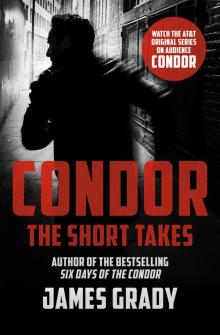 The Short Takes
The Short Takes Montana Noir
Montana Noir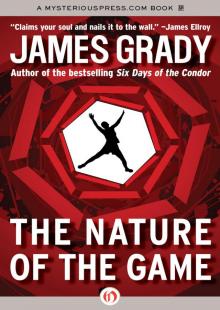 Nature of the Game
Nature of the Game Condor in the Stacks
Condor in the Stacks This Given Sky
This Given Sky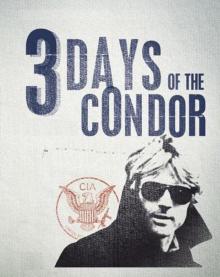 Three Days of the Condor
Three Days of the Condor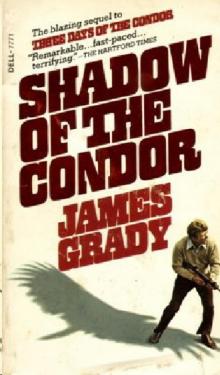 Shadow of the Condor
Shadow of the Condor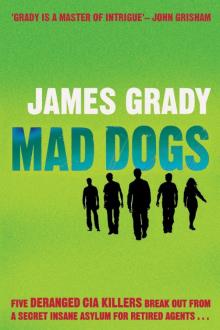 Mad Dogs
Mad Dogs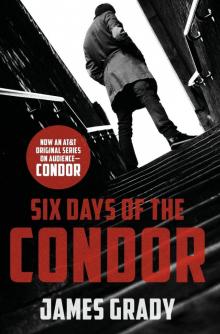 Six Days of the Condor
Six Days of the Condor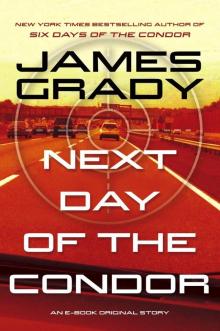 Next Day of the Condor
Next Day of the Condor